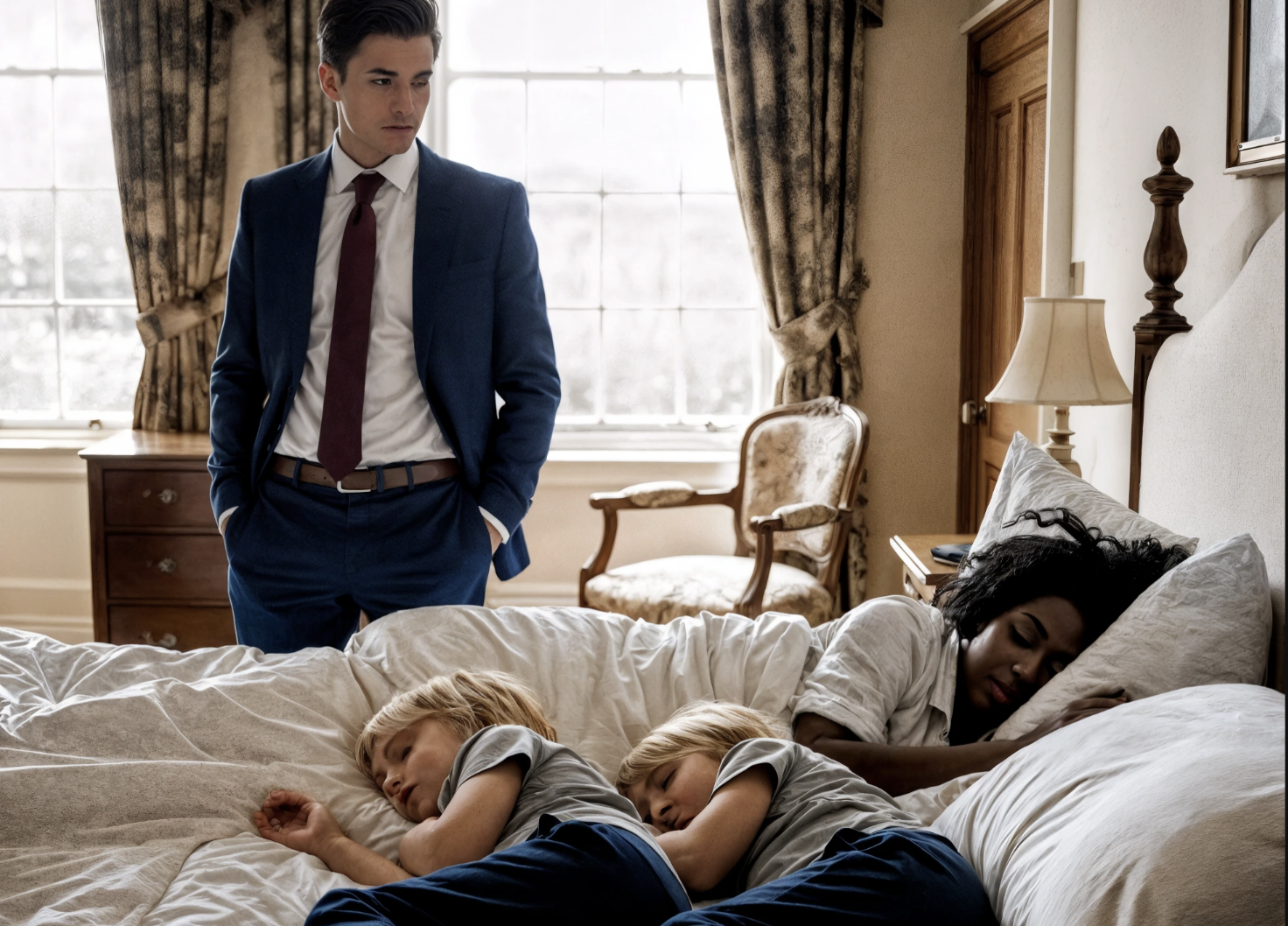Edward Hawthorne had everything—wealth, power, influence. But none of that mattered in the echoing silence of Hawthorne Manor. Not since his wife, Juliette, passed away unexpectedly. Not since Ethan and Eli, their six-year-old twins, stopped speaking.
It began subtly: Ethan refused to eat certain foods, Eli wouldn’t sleep unless every light in the house was on. Then came the night terrors. Nosebleeds. Panic attacks. Strange drawings of shadows with eyes.
Fourteen nannies came and went. One lasted a week. Another only hours. Some cited stress. Others spoke of something more unsettling—a presence in the home. Edward dismissed it all. What mattered were his sons. And they were slipping further away each day.
When Maya Williams arrived, no one expected her to last long. Edward barely glanced at her resume. A 38-year-old woman from Baltimore with no degrees in child psychology, no famous clients, no credentials. But she had a calm presence and a warmth that didn’t feel performative.
She wore earth tones and kept her hair wrapped in soft fabric. She didn’t raise her voice, didn’t force affection. She simply observed. In the chaos of private chefs, housekeepers, and bodyguards, Maya was invisible. A shadow. Like the boys.
The first breakthrough came quietly.
One morning, Edward came downstairs to find Maya sitting on the floor between Ethan and Eli, helping them build a structure from old books and colored yarn. No instructions. No rigid expectations. Just play. The twins didn’t smile, but they didn’t cry either. That alone felt like a miracle.
Then came the night of the storm.
The wind shrieked through the halls of the manor. The lights flickered. The twins, already sensitive to sound, were inconsolable. They screamed and shook, covering their ears, crying out for someone named “The Gray Lady,” a name Edward had never heard them mention before.
He raced to the nursery, nearly tripping over scattered toys. But when he opened the door, the boys were gone.
Panic surged through him.
Then he heard it. A voice—not shouting, but singing—low and steady, coming from his bedroom.
He flung open the door.
There, in the center of the room, stood Maya. Barefoot, wrapped in a blanket, she held both boys in her arms. They clung to her, faces pressed into her chest, their breathing slow and even.
She was singing in a language Edward didn’t recognize. The melody was ancient, circular, rising and falling like the tide. Around them, candles flickered, casting shadows that danced on the walls.
Edward’s jaw tensed.
“What the hell is going on?” he demanded.
Maya didn’t stop singing. She met his eyes, calm but firm. “Don’t raise your voice.”
He took a step forward.
Eli whimpered. Ethan’s grip tightened.
Maya gently kissed both boys on the forehead. She placed them on the bed, tucked them in, and whispered something so softly Edward couldn’t hear.
When she finally stood, the boys were asleep—truly asleep—for the first time in months.
Edward pulled her into the hallway.
“You don’t take them from their room,” he snapped. “You don’t light candles in my house. And you certainly don’t chant in some unknown language in my bedroom!”
She didn’t flinch.
“I did what none of your money could. I soothed them.”
“What were you even saying?”
She sighed.
“My grandmother was Yoruba. That was an ancestral lullaby. It’s… meant to protect children from spirits who linger in grief.”
“Spirits?” he scoffed.
“Your sons believe something is in this house. And I believe them.”
He stared at her. “You’re fired.”
Maya’s eyes didn’t waver. “No, I’m not.”
He blinked.
“I’ll leave when they stop drawing shadows with teeth. When they stop whispering about the woman in the walls. When they sleep through the night without shaking.”
And with that, she returned to the boys.
Edward didn’t sleep. He wandered the halls, haunted by memories of Juliette’s laughter, of happier times. At 3 a.m., he found himself standing outside the nursery door. It was quiet.
The next morning, the twins were eating pancakes. Smiling. Eli handed Edward a drawing—a house, a bright sun, and three stick figures. The caption, in a child’s careful scrawl: “Us with Miss Maya.”
He stared at it longer than he intended.
That afternoon, Edward called his lawyer to double Maya’s salary. He didn’t mention spirits again.
But the house began to change.
The boys no longer screamed at night. Their nosebleeds stopped. The cold spots in the hallway faded. Maya began teaching them rhythm through drumming, dance through movement, stories through touch.
One evening, Edward came home early to find Maya and the twins gathered around a circle of salt and sage in the sitting room.
“Maya?” he asked, more curious than angry.
“We’re asking the Gray Lady to leave,” she said simply.
Eli added, “We told her we’re okay now.”
Ethan chimed in, “She was just sad.”
Maya nodded. “They believe she was looking for your wife.”
Edward stood still. His chest ached.
That night, he went into Juliette’s old studio. Dusted the untouched canvases. Wept for the first time in a year.
Weeks passed. The drawings on the walls changed—no more shadows, no more crying faces. Just suns, stars, and oceans.
And Maya stayed.
Not because she needed the job.
Because she had seen something in the twins that no one else had: not disorder, not damage—but grief. Sacred and strange. And worthy of listening.
